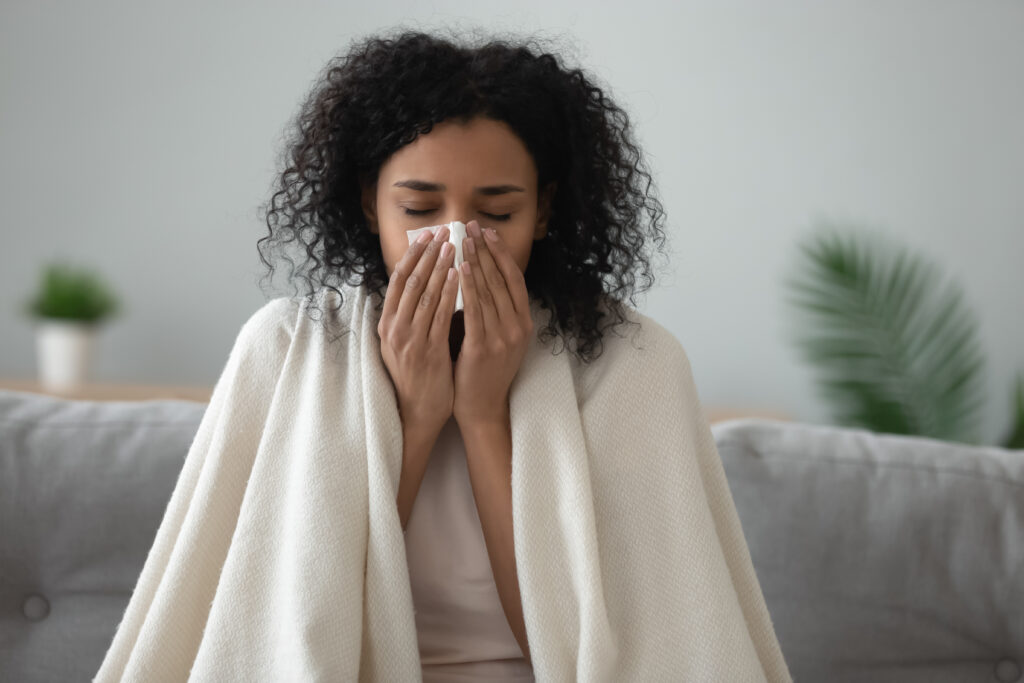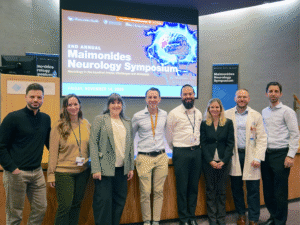Fall is here, and allergens like ragweed, mold, and mushroom spores are in the air. Roughly one in three American adults and one in four children have a seasonal, skin, or food allergy, and many will make appointments about allergy-related symptoms.
Correctly diagnosing and treating allergies is complicated. Multiple problems cause the same symptoms, and figuring out the trigger requires precise testing. Allergy and immunology experts at Maimonides Medical Center offer this high level of specialized care to adult and pediatric patients.
When to Consider an Allergist
Patients frequently seek care for skin, nose, lung, and stomach symptoms that may be allergy related. These can include:
- Diarrhea
- Hives
- Itchy eyes
- Runny nose
- Sneezing
- Vomiting
- Wheezing
Identifying a symptom’s root cause can be difficult. So, like a primary care provider who refers patients with abnormal EKGs to a cardiologist for advanced care, patients with allergy symptoms also need specialty help. Symptoms may take hours to appear after exposure, and tests administered incorrectly or at the wrong time can produce inaccurate results.
Allergists have the expertise, access to the latest research, and medication and testing knowledge needed to recognize symptom patterns and diagnose and treat allergy signs.
“Specialists have the breadth of knowledge to identify the type of symptom a patient is having and decide on the correct test to administer,” says Michael Marcus, MD, Director of Pediatric Pulmonary Medicine and Allergy and Immunology at Maimonides. “Non-specialists may only know to do one type of test, and may not have the full background to completely understand all potential results.”
For example, if a patient develops hives after taking an antibiotic, an allergist can test whether the hives are an allergic reaction or the patient’s response to the infection.
Identifying the Allergy Cause
During an allergic reaction, a patient’s immune system produces immunoglobulin (IgE) antibodies. These antibodies bind to allergens to produce symptoms. Allergists have the expertise to determine if someone is having a:
- True allergy: An exposure that prompts the body’s production of IgE
- Drug sensitivity: A response that produces allergy-like symptoms but no IgE
- Medication side effect: A response that does not involve the immune system or produce IgE
Skin testing — slowly exposing patients to larger doses of an allergen — is the allergy testing gold standard, and Maimonides allergy experts have the training to conduct these tests, analyze the results and determine what type of reaction the patient is experiencing.
Advanced Allergy Treatments
Allergy treatments have progressed significantly over the past 10 years, and Maimonides allergists are well-versed in the latest therapies. They can fully explain the differences and help patients choose the best care options.
“Biologic medications are the most significant advancement,” says Dr. Marcus. Allergy specialists use these gene-based and cellular precision-medicine drugs to prevent the symptoms of:
- Asthma
- Eczema
- Gastrointestinal issues with allergy components
- Nasal polyps
- Urticaria
Allergists can determine if immunotherapy or allergy shots are a patient’s best therapeutic option. Dr. Marcus and Mary Lee-Wong, MD, Chief of Adult Allergy and Immunology at Maimonides, are both board-certified allergists who specialize in allergic care, trained to identify and deliver appropriate treatment options. At Maimonides, patient care and safety are a priority, and allergists are well equipped to handle any possible reaction to shots, keeping patients safe.
Multidisciplinary Teams
Allergists work closely with other specialists to address any allergy components related to various conditions. As healthcare partners, allergists collaborate with pulmonologists, dermatologists, otolaryngologists, and gastroenterologists. Together, they can improve outcomes and control a variety of conditions, including asthma, eczema, chronic sinus disease, and more.
They also work with primary care providers as members of a patient’s clinical care team. Their expertise contributes to diagnosis, treatment, and medication management.
“We are here to engage in shared decision-making with our patients and our colleagues,” says Dr. Lee-Wong. “We are a team dedicated to giving our patients the absolutely best care. We all work together to create the best plan of action.”
Avoiding Emergencies and Flare-ups
Allergy-related emergencies are on the rise. Specialized allergy care can reduce the likelihood that patients will land in the emergency room or have a flare-up.
Armed with the results of physical exams and diagnostic testing, allergists are best positioned to explain what triggers a patient’s allergic reaction. They are also best prepared to explain the lifestyle changes that can help reduce symptoms. Dr. Lee-Wong recommends the following lifestyle changes:
- Decrease dust by running air conditioning and a dehumidifier
- Keep bedrooms cool and dry
- Keep pets out of bedrooms
- Wash sheets and pillowcases twice a week in hot water
The Maimonides Difference
Our board-certified allergy and immunology experts offer years of experience. They collaborate as a team to diagnose patients and recommend the best treatment options. Our specialists speak multiple languages and offer broad access to care for patients from various cultures.
To make an appointment or referral, schedule online or by phone:
- Michael Marcus, MD, (718) 283-7500
- Mary Lee-Wong, MD, (718) 283-2550.




